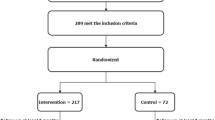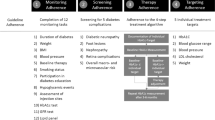Abstract
Objective
To evaluate the efficacy of a structured diabetes care program (Freedom 365*) as compared to routine medical care (RMC), for management of type 2 diabetes.
Method
A retrospective study of Freedom 365* program versus RMC for diabetes management was carried out. 388 participants (247 men, 141 women; mean age 57 years), who completed 1 year since first contact were analysed. All the participants received a detailed diabetes patient education program, at first contact with the centre and had the choice of opting for either Freedom 365* or RMC.
Results
Out of 388 participants at baseline, 244 (154 men, 90 women) patients opted for Freedom 365* and 144 (93 men, 51 women) opted for RMC. The Freedom 365* group showed 90 % improvement, 2 % had no change and 8 % had deterioration in HbA1c levels. In the RMC group 82 % had improvement, 3 % had no change and 15 % showed deterioration in HbA1c levels. The Freedom 365* group had significantly greater drop in HbA1c [median 1.4 (−2.5, 7.7) vs.0.9 (−2.1, 8.9): p < 0.004], from baseline to follow up. The Freedom group had significantly better compliance in terms of frequency of screening/monitoring per annum for glycemic control [HbA1c –median 3(2, 4) vs. 2(0, 2): p < 0.001], lipid profile (100 vs. 95 %: p < 0.001), microalbuminuria (100 vs. 38 %: p < 0.0001), anaemia screening (100 vs. 29 %: p < 0.0001) and liver function test (100 vs. 29 %: p < 0.0001).
Conclusion
Freedom 365*, a structured diabetes care program of on-going diabetes education, diet and lifestyle correction, biochemical investigations, clinical monitoring and treatment at regular intervals, results in better clinical outcomes and adherence to therapy in management of type 2 diabetes as compared to RMC.

Similar content being viewed by others
References
Anjana RM, Pradeepa R, Deepa M, Datta M, Sudha V, Unnikrishnan R, et al. Prevalence of diabetes and prediabetes (impaired fasting glucose and/or impaired glucose tolerance) in urban and rural India: phase I results of the Indian Council of Medical Research-INdia DIABetes (ICMR-INDIAB) study. Diabetologia. 2011;54:3022–7.
Ramachandran A, Snehalatha C, Ma RCW. Diabetes in South-East Asia: an update for 2013 for the IDF diabetes atlas. Diabetes Res Clin Pract. 2013.
Kumpatla S, Kothandan H, Tharkar S, Viswanathan V. The costs of treating long-term diabetic complications in a developing country: a study from India. J Assoc Physicians India. 2013;61:102–9.
The Diabetes Control and Complications Trial Research Group. The effect of intensive treatment of diabetes on the development and progression of long-term complications in insulin-dependent diabetes mellitus. N Engl J Med. 1993;329:977–86.
(UKPDS) Group: UPDS. Intensive blood-glucose controlwith sulphonylureas or insulin comparedwith conventional treatment andrisk of complications in patients withtype 2 diabetes (UKPDS 33). Lancet. 1998;352:837–52.
Patel A, MacMahon S, Chalmers J, Neal B, Billot L, Woodward M, et al. Intensive blood glucose control and vascular outcomes in patients with type 2 diabetes. N Engl J Med. 2008;358:2560–72.
Gakidou E, Mallinger L, Abbott-Klafter J, Guerrero R, Villalpando S, Ridaura RL, et al. Management of diabetes and associated cardiovascular risk factors in seven countries: a comparison of data from national health examination surveys. Bull World Health Organ. 2011;89:172–83.
Joshi SR, Saboo B, Vadivale M, Dani SI, Mithal A, Kaul U, et al. Prevalence of diagnosed and undiagnosed diabetes and hypertension in India–results from the Screening India’s Twin Epidemic (SITE) study. Diabetes Technol Ther. 2012;14:8–15.
Davies MJ, Heller S, Skinner TC, Campbell MJ, Carey ME, Cradock S, et al. Effectiveness of the diabetes education and self management for ongoing and newly diagnosed (DESMOND) programme for people with newly diagnosed type 2 diabetes: cluster randomised controlled trial. BMJ. 2008;336:491–5.
Khunti K, Gray LJ, Skinner T, Carey ME, Realf K, Dallosso H, et al. Effectiveness of a diabetes education and self management programme (DESMOND) for people with newly diagnosed type 2 diabetes mellitus: three year follow-up of a cluster randomised controlled trial in primary care. BMJ. 2012;344:e2333.
Olivarius NF, Beck-Nielsen H, Andreasen AH, Hørder M, Pedersen PA. Randomised controlled trial of structured personal care of type 2 diabetes mellitus. BMJ. 2001;323:970–5.
Deakin T, McShane CE, Cade JE, Williams RDRR. Group based training for self-management strategies in people with type 2 diabetes mellitus. Cochrane Database Syst Rev. 2005:CD003417.
Deakin TA, Cade JE, Williams R, Greenwood DC. Structured patient education: the diabetes X-PERT Programme makes a difference. Diabet Med. 2006;23:944–54.
Yam FK, Adams AG, Divine H, Steinke D, Jones MD. Clinical inertia in type 2 diabetes: a retrospective analysis of pharmacist-managed diabetes care vs. usual medical care. Pharm Pract Granada. 2013;11:203–10.
Standards of medical care in diabetes. Diabetes Care. 2014;37 Suppl 1:S14–80.
Acknowledgements
The authors acknowledge the contribution of following staff at JUST Diabetes, in providing vital support to carry out the study and collection of data. Doctors (Aditi Laud, Jimit Chowdhary, Nikhil Sardar, Late. Malih Siddiqui, Ragini Maheshwari, Shweta Gupta), diabetes educators (Mr. Sudhakar Singh, Priyanka Dhane, Amreen Shaikh), dieticians (Alpana Cheulkar, Reema Soni, Hetal sharma, Ushma Karia, Mukta Agarwal), physiotherapists (Bhoomi Patel, Deepali Pandey, Vaibhavi Satam) Diabetes foot specialists (Aleyamma James, Steffi Thomas, Madhavi Pathare), Lab technicians (Kishori Bhojwani, Rajgopal Shukla, Kruti Desai, Shweta Juvekar), Optometrist (Vini Satra).
Grant support
This work was funded by the management at JUST Diabetes.
Disclosure
All the listed authors do not have any conflict of interest.
Author information
Authors and Affiliations
Corresponding author
Rights and permissions
About this article
Cite this article
Singh, D.K., Tari, V. Structured diabetes care (Freedom 365*) provides better glycemic control than routine medical care in type 2 diabetes: proof of concept observational study. Int J Diabetes Dev Ctries 35, 289–296 (2015). https://doi.org/10.1007/s13410-014-0267-y
Received:
Accepted:
Published:
Issue Date:
DOI: https://doi.org/10.1007/s13410-014-0267-y




